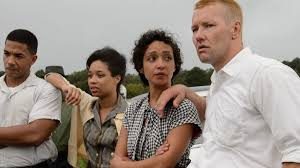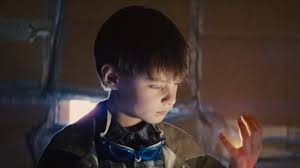GUESS WHO’S COMING TO DINNER: Movie reviews of Beatriz at Dinner and It Comes at Night by Howard Casner
Posted: June 22, 2017 | Author: Donald | Filed under: Uncategorized | Tags: Beatriz at Dinner, Carmen Ejogo, Chloȅ Sevigny, Christopher Abbott, In It Comes at Night, Jay Duplass, Joel Edgerton, John Lithgow, Kelvin Harrison Jr., Michael White, Miguel Arteta, Riley Keaugh, Salma Hayek, Trey Edward Shults | 1,454 Comments » For questions: hcasner@aol.com
For questions: hcasner@aol.com
First, a word from our sponsors: I am now offering a new service: so much emphasis has been given lately to the importance of the opening of your screenplay, I now offer coverage for the first twenty pages at the cost of $20.00. For those who don’t want to have full coverage on their screenplay at this time, but want to know how well their script is working with the opening pages, this is perfect for you. I’ll help you not lose the reader on page one.
Ever wonder what a reader for a contest or agency thinks when he reads your screenplay? Check out my new e-book published on Amazon: Rantings and Ravings of a Screenplay Reader, including my series of essays, What I Learned Reading for Contests This Year, and my film reviews of 2013. Only $2.99. http://ow.ly/xN31r
and check out my Script Consultation Services: http://ow.ly/HPxKE
Warning: SPOILERS
 Beatriz at Dinner is writer Michael White and director Miguel Arteta’s third film collaboration after Chuck and Buck (an interesting character study of a gay man wanting to take up a former relationship with his best friend who is now married and apparently no longer gay) and The Good Girl (a modern day somewhat clever take on Madame Bovary).
Beatriz at Dinner is writer Michael White and director Miguel Arteta’s third film collaboration after Chuck and Buck (an interesting character study of a gay man wanting to take up a former relationship with his best friend who is now married and apparently no longer gay) and The Good Girl (a modern day somewhat clever take on Madame Bovary).
Together they have made a very solid series of films. Nothing perhaps to light up the sky, but still, quite respectable and entertaining.
Beatriz at Dinner is probably their most ambitious. At the same time, however intriguing and entertaining it often is, it is probably their weakest. I think this may be because they set up an intriguing premise, but failed to, or didn’t know how to, really resolve it all in a rich and satisfying way. Read the rest of this entry »
FUHGEDDABOUDIT: Movie Reviews of Coming Home and Black Mass by Howard Casner
Posted: September 27, 2015 | Author: Donald | Filed under: Uncategorized | Tags: Adam Scott, Benedict Cumberbatch, Black Mass, Coming Home, Corey Stoll, David Harbour, Huiwen Zhang, Jesse Plemons, Jez Butterworth, Jingzhi Zou, Joel Edgerton, John Connolly, Johnny Depp, Kevin Bacon, Li Gong, Mark Mallouk, Peter Sarsgaard, Random Harvest, Rory Cochrane, Scott Cooper, W. Earl Brown, Whitey Bulger, Yanshi (Daoming Chen, Yimou Zhang | 7 Comments »First, a word from our sponsors: I am now offering a new service: so much emphasis has been given lately to the importance of the opening of your screenplay, I now offer coverage for the first twenty pages at the cost of $20.00. For those who don’t want to have full coverage on their screenplay at this time, but want to know how well their script is working with the opening pages, this is perfect for you. I’ll help you not lose the reader on page one.
Ever wonder what a reader for a contest or agency thinks when he reads your screenplay? Check out my new e-book published on Amazon: Rantings and Ravings of a Screenplay Reader, including my series of essays, What I Learned Reading for Contests This Year, and my film reviews of 2013. Only $2.99. http://ow.ly/xN31r
and check out my Script Consultation Services: http://ow.ly/HPxKE
Warning: SPOILERS
In 1942, Ronald Colman played a character so shell shocked by the trenches of World War I that he walked out of the hospital where he was recovering, having no idea who he was.
He was taken in by a singer in a vaudeville house (Greer Garson), fell in love and the two married. Then years later, he suddenly, out of nowhere, remembered who he really was, but totally forget that his wife existed. He discovers he’s the scion of a wealthy family and eventually runs for political office, not knowing that his secretary is actually his wife.
This movie is Random Harvest and is perhaps the most romantic and delirious use of amnesia in film. But amnesia has always been a useful tool of storytelling, whether romantic (here and in Law of Desire) or in thrillers (Mr. Budwing and Mirage) or comedy (The Hangover and 50 First Dates).
 Coming Home, written by Jingzhi Zou and directed by Yimou Zhang, falls into the more melodramatic end of the spectrum like Random Harvest. It’s unabashedly sentimental and relishes in a sort of 1930’s studio romanticism tone and style, though the grittiness makes it more Warner Brothers than MGM. Read the rest of this entry »
Coming Home, written by Jingzhi Zou and directed by Yimou Zhang, falls into the more melodramatic end of the spectrum like Random Harvest. It’s unabashedly sentimental and relishes in a sort of 1930’s studio romanticism tone and style, though the grittiness makes it more Warner Brothers than MGM. Read the rest of this entry »
BULLY, BULLY and WOOLY, WOOLY: Movie reviews of The Gift and Shaun the Sheep Movie by Howard Casner
Posted: August 18, 2015 | Author: Donald | Filed under: Uncategorized | Tags: Allison Tolman, Jason Bateman, Joel Edgerton, Mark Burton, Rebecca Hall, Richard Starzak, Shaun the Sheep Movie, The Gift, Wendell Pierce | 5 Comments »First, a word from our sponsors: I am now offering a new service: so much emphasis has been given lately to the importance of the opening of your screenplay, I now offer coverage for the first twenty pages at the cost of $20.00. For those who don’t want to have full coverage on their screenplay at this time, but want to know how well their script is working with the opening pages, this is perfect for you. I’ll help you not lose the reader on page one.
Ever wonder what a reader for a contest or agency thinks when he reads your screenplay? Check out my new e-book published on Amazon: Rantings and Ravings of a Screenplay Reader, including my series of essays, What I Learned Reading for Contests This Year, and my film reviews of 2013. Only $2.99. http://ow.ly/xN31r
and check out my Script Consultation Services: http://ow.ly/HPxKE
Warning: SPOILERS
 There’s a very telling scene and line in The Gift, the new thriller written, directed and starring Australian jack of all trades Joel Edgerton (you know, just because you’re from another country doesn’t mean you can’t leave a few jobs for the locals, mate).
There’s a very telling scene and line in The Gift, the new thriller written, directed and starring Australian jack of all trades Joel Edgerton (you know, just because you’re from another country doesn’t mean you can’t leave a few jobs for the locals, mate).
Husband and wife Simon and Robyn have recently moved to California for Simon’s new job. The town is Santa Clarita (if my memory serves) where Simon grew up and went to school. While out shopping the couple run into Gordo, an old classmate of Simon’s, someone Simon claims he can barely remember, though Gordo seems to have no trouble remembering Simon.
Gordo suddenly starts showing up at the couple’s house with gifts, though it’s hard to tell whether he’s creepy or just socially awkward. But one night he leaves after having been invited to dinner (well, has sort of forced them to invite him to dinner) and Simon says there is something odd about him.
The reason this is telling is because it is also somewhat ironic since, by this time, it’s rather clear that there is something odd about Simon. Read the rest of this entry »
IT’S RAINING MANLY MEN: Movie Reviews of The Rover and Policeman by Howard Casner
Posted: June 17, 2014 | Author: Donald | Filed under: Uncategorized | Tags: Antony Partos, David Michod, Guy Pierce, Joel Edgerton, Michael Aloni, Nadav Lapid, Policeman, Robert Pattinson, Scoot McNairy, The Rover, Yiftach Klein | 1,764 Comments »Ever wonder what a reader for a contest or agency thinks when he reads your screenplay? Check out my new e-book published on Amazon: Rantings and Ravings of a Screenplay Reader, including my series of essays, What I Learned Reading for Contests This Year, and my film reviews of 2013. Only $2.99. http://ow.ly/xN31r
Warning: SPOILERS
“Okay, too much testosterone around here for me.” Tyler Ann Endicott, Point Break
Two movies have just opened that filled me with much relief that smellovision never caught on. Both films are jam-packed to the brim with characters so masculine they ooze hormones to the extent their odor would grow hair on your chest if it was released into the auditorium.
 In the new Australian thriller The Rover, written and directed by David (Animal Kingdom) Michod from a story by Michod and Joel Edgerton (yes, that Joel Edgerton), it’s ten years after “the collapse”, a catastrophe that is never (to the movie’s credit) clearly defined, but has resulted in a Down Under that is in a near state of anarchy with the military standing in for the police; gas and food in short supply; the American dollar being the only trusted currency (hey, it could happen); and nobody seeming to have taken a bath in years. Read the rest of this entry »
In the new Australian thriller The Rover, written and directed by David (Animal Kingdom) Michod from a story by Michod and Joel Edgerton (yes, that Joel Edgerton), it’s ten years after “the collapse”, a catastrophe that is never (to the movie’s credit) clearly defined, but has resulted in a Down Under that is in a near state of anarchy with the military standing in for the police; gas and food in short supply; the American dollar being the only trusted currency (hey, it could happen); and nobody seeming to have taken a bath in years. Read the rest of this entry »
Movie Review of THE GREAT GATSBY by Howard Casner
Posted: May 15, 2013 | Author: Donald | Filed under: Uncategorized | Tags: Baz Luhrmann, Carey Mulligan, Craig Pearce, Joel Edgerton, Leonardo DiCaprio, The Great Gatsby, Tobey Maguire | 4,216 Comments »The new version of F. Scott Fitzgerald’s novel The Great Gatsby is filmed by director Baz Luhrmann as if everyone and everything in it had a fever, which in many ways is probably a very acute approach to this story that takes place during a particular frenzied time in U.S. history. Everything is hyped, over the top, as if it’s on Benzedrine. As a result, this is probably Luhrmann’s best film to date. This is not to say it’s a good film (it doesn’t quite go there), but it’s certainly far superior to Romeo + Juliet and Moulin Rouge!
People always talk of the difficulty of adapting Fitzgerald’s classic novel (which wasn’t so classic when it came out; it flopped miserably when it was first published). For me, the problem has always revolved around the character of Gatsby himself, who is, in many ways, the least interesting person in the book. He’s not the central character; Nick Carroway, the somewhat callow observer, has that honor and it’s Nick who the story is about. And most of what makes Gatsby interesting takes place in the past long before the story starts; and when this past is related, it’s often open to credulity. So how do you dramatize a story about someone who is a secondary character and whose past is primarily myth?
Luhrmann and his co-writer, Craig Pearce, in many ways take the same tact that the writers and director did in the 1949 version starring Alan Ladd. They downplay all the other characters and fight fiercely to bring Gatsby center stage. The Ladd version did it by turning the story of Gatsby into a film noir, fully dramatizing in flashback his rise to gangster glory. Luhrmann and Pearce do it by emphasizing the love story between Gatsby and Daisy, giving it a tragic, star crossed lovers feel.
This approach has its downside. It often reduces the other characters to their bare necessities. Jordan Baker now has so little to do, one wonders why she is even in the picture. And the Wilsons, George and Myrtle, are now no more than mere melodramatic contrivances (this actually works the best because these two characters now feel more like toys that the well to do play with rather than real characters in their own right).
But from a dramatic standpoint, Luhrmann’s approach was probably a sound stratagem because the romance is the part of the movie that works the best. There is something touching, often beautiful, about these two doomed lovers. Luhrmann is able to restrain himself a bit here and let the actors and the screenplay pull their weight such that when Gatsby is a terrified little boy waiting for Daisy to arrive for tea or when he is throwing his shirts down to Daisy, the moments become rather transcendental.
Of course, Luhrmann and Pearce have to cheat a bit to make it work. They up the tragedy by purifying the love story. In the novel, one of the reasons Gatsby is attracted to Daisy is due to her background (the movie leaves out Gatsby’s line that Daisy’s voice sounds like “money”) and the writers downplay that one of the reasons Daisy first rejects Gatsby is because he has no wealth and then accepts him more to get back at her husband for cheating on her than out of true love. And they also play a bit fast and lose on the death of Myrtle; in the book, there’s some indication it wasn’t totally an accident, that Daisy swerved the car purposely, while in the movie the suggestion is that it was completely unintentional and unavoidable. No, Luhrmann instead decides to swoon in delirium over the couples feelings for each other. And some good swooning it is.
Leonardo DiCaprio is Gatsby and it is his performance that holds the movie together. When he appears, DiCaprio shows both Gatsby’s strength and vulnerability at the same time just by standing there. His line readings are spot on; even the “old sport”, a phrase almost impossible to say with a straight face (maybe it works because DiCaprio pronounces the words as if they are as much of a sham as the house he lives in and the parties he throws). This Gatsby is both so fierce and adorable in what he wants, he makes us want it to.
And he gets able support from Carey Mulligan as Daisy and Joel Edgerton as her racist, to the manor born husband Tom. They have great chemistry with DiCaprio and match him line reading for line reading. It all results in a scene that feels like it’s torn from a boulevard drama: all the characters are trapped in a hotel room together when everything comes out. Everyone plays it like they were doing O’Neill and they pretty much get away with it. Sad to say, though, Tobey Maguire, as Carraway, is the weak point here. He is given the thankless task of voice over narrating. But the narration is clunky and Maguire is listless and flat, a deadly combination.
But in the end, though there is actually much to like here, and even much to admire, it never quite comes together in a satisfying whole. It works best when Luhrmann matches his editing and directing style to the brilliantly chosen, but often anachronistic music. However, the film is more of an interpretation of The Great Gatsby rather than a story that works in its own right. This even leads to Luhrmann and Pearce working very hard to parallel the story to today: Nick works in bonds at a time just before the country will be hit by recession; Tom is a representative of the 1% while the Wilsons are the 99; and the authors really emphasize the increasing presence of blacks in society.
But Luhrmann is also such a visual stylist and such an over director, that all subtlety is lost. Everything is over telegraphed to such a degree that the weak parts of the book (the obvious symbolism of the eyes of Dr. T.J. Eckleburg and the melodramatic contrivances of who is driving what car when Myrtle is killed) only feel weaker, while the strengths of the book are done so big they often get in the way of allowing one to become emotionally involved in the story as one would like. Rather than feel the emotions, you are much more interested in critiquing Luhrmann’s approach to the material (though I have to say, I loved the Rhapsody in Blue intro of Gatsby at his party).
Tell me what you think.










 You can almost hear the people in the marketing meeting breathe a sigh of relief when it comes to titling the new film, the true story of a couple from different races who got married and were arrested for it.
You can almost hear the people in the marketing meeting breathe a sigh of relief when it comes to titling the new film, the true story of a couple from different races who got married and were arrested for it. Midnight Special, the new neo-noir/sci-fi film, opens at night with a throbbing music score backed by hypnotic drums. It grabs you by your neck and just won’t let go for the next ninety minutes. At first, the story seems to be about the abduction of a little boy, but it soon becomes clear that it’s much more complicated than that. The boy was adopted by the leader of a religious cult that makes its base in a private compound in Texas and the ones who have taken the boy from them is the boy’s biological father and the father’s closest friend.
Midnight Special, the new neo-noir/sci-fi film, opens at night with a throbbing music score backed by hypnotic drums. It grabs you by your neck and just won’t let go for the next ninety minutes. At first, the story seems to be about the abduction of a little boy, but it soon becomes clear that it’s much more complicated than that. The boy was adopted by the leader of a religious cult that makes its base in a private compound in Texas and the ones who have taken the boy from them is the boy’s biological father and the father’s closest friend.
